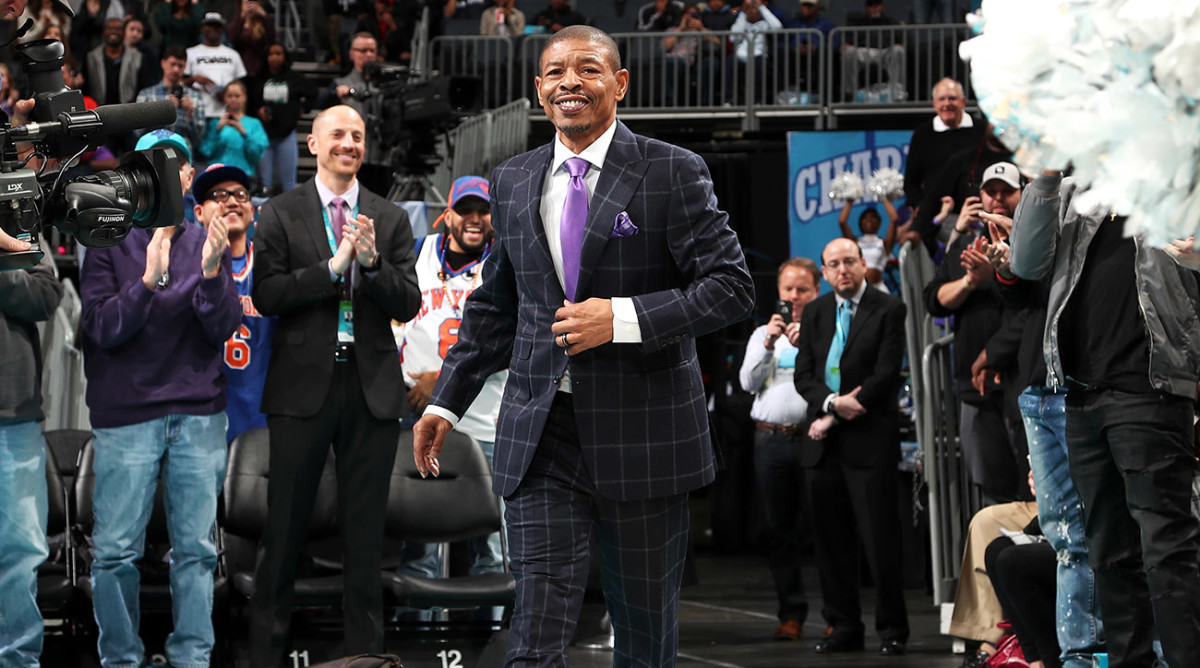Baltimore Still Runs in Muggsy Bogues’s Blood

Crime, drugs and gangs found a home at Lafayette Court, along with 500 families, making an escape from the East Baltimore project dwellings nearly impossible. Anyone who entered the premises, let alone lived there, walked into an endless cycle of violence at every corner at any time. Private security guards hired to protect the grounds reportedly turned in their badges after gunshots rang out in bulletproof lobby stations.
Muggsy Bogues, sitting worlds away from this former reality, leaned forward with his hands folded at the NBA offices in midtown Manhattan in mid-January. The high-rise building provided a sense of security that was non-existent in his hometown of Baltimore. St. Patrick’s Cathedral and the Empire State Building set the backdrop through the conference room window—a somewhat fitting background for an undersized point guard who rose from adversity to adoration out of nowhere.
ABDELDAIEM: Wade Enters Denouement of Last Dance
Appearing healthy enough to suit up again for the Hornets, the shortest player in NBA history flew into town to promote All-Star weekend in Charlotte, where he created a home away from home for 10 seasons and in retirement. But East Baltimore still runs through his veins. It’s easy to tell in conversation. The memories are still fresh.
“When I was five years old, I got shot. You know, being at the wrong place at the wrong time,” Bogues said. “Life expectancy in our neighborhood wasn’t past 20. So for me to go through that at five, I mean, that was it. So I survived that, and I was like ‘Oh s—, I’m good.’”
Before the shooting, jokes ending with punch lines about his height would pierce Bogues the way a stray bullet punctured his arm and back. He was old enough to understand the dangers of Lafayette Court at the time, but too young to prepare for its perils. After the shooting, no insult could equal the pain of walking wounded up 10 flights of stairs to his apartment for fear of who—or what—might await him on the elevator.
Bogues found healing every day after school at the Lafayette Recreation Center, rehabbing with ping-pong, table pool and wrestling with his childhood friend and future Dunbar High School teammate, Reggie Williams.
Director Leon Howard had a track record for harvesting East Baltimore’s youth, and Bogues and Williams’s natural athleticism placed them next in line to be mentored. Williams remembers Howard showing the two an awards plaque on the wall with names of the city’s All-American basketball players engraved. “Skip Wise,” he read.
“Muggsy said, ‘One day, I’m going to be up there,” Williams drew from memory. “I said, ‘Muggsy, I’m going to be up there.’”

Bogues and Williams replaced the pool stick, ping-pong rackets and wrestling moves with basketball lessons under Howard’s instruction. The focus was all about basketball all the time. The more his students learned, the easier the game came. The more the teammates practiced together, the closer their bond. And the more games the friends played, the further they traveled away from the harsh realities waiting for them back at home. Life at Lafayette Court felt different over time whenever Bogues returned.
“I do recall the day I went back down to the basketball court, hearing the same negative stuff,” Bogues said. “But it didn’t have the same impact. Me knowing that information of the game and knowing how to play the game, that’s all I needed. And from that moment [after the shooting] on, I didn’t feel the same about when folks called me short. I didn’t care about what other people thought, because then my opponent was my feedback. That was the mindset I took every time I took the floor.”
The opposition only heated up at Dunbar High School. During the 1981-82 season, the junior (and Williams) led the Poets to face the country’s No. 1-ranked school, Camden (N.J.) High, and top prospect Billy Thompson. Over 100 miles away, the New Jersey gym resembled pieces of Baltimore. Radio broadcaster Sonny Hill quipped, “Look at this little kid. Aw man, he’s going to get killed,” according to former Dunbar head coach Bob Wade. The crowd jeered at the 5-foot-3 point guard during starting lineup introductions. Bogues’s opponent wrapped his arm around the Dunbar star after a pregame handshake at midcourt, turned to the crowd and said, “Look at this little guy.”
“He came back to the bench, and I said, ‘Short man, are you OK?’” Wade said. “He said, ‘Coach, I’m fine. We’re getting ready to have a party out here.’”
Bogues stole the ball on three straight possessions in the opening moments. The Poets won by 25 points and danced to an undefeated season (29-0).
“They might have been laughing before the game,” Williams recalled from his playing time with Bogues, “but after the game, it was always congratulations, because all the doubt was gone after that tipoff.”
NADKARNI: The Porzingis Trade Is All About Durant for Knicks
Bogues and Williams graduated and left East Baltimore to star at Wake Forest and Georgetown, respectively, and both were selected in the first round of the 1987 NBA draft. Bogues quickly became a fan favorite when he joined the Hornets via the 1988 Expansion draft, finishing as the franchise’s leader in assists, steals and minutes played.
An All-Star selection never came for Bogues during 14 years in the NBA. He wasn't selected for Charlotte’s last All-Star Game in 1991 and the 1993-94 snub in Minneapolis still stings (“I felt like I got slighted, averaging a double-double. Those things happen,” Bogues said).
But Bogues won’t miss out this year. As the official Hornets ambassador, he’s positioned in the right place at the right time for All-Star weekend, beginning Feb. 15.
“It’s just going to be a fun time for family and friends to come take part of,” Bogues said. “Because we need that at this time. A little laughter, excitement and love and care. … And that’s what it’s all about.”
